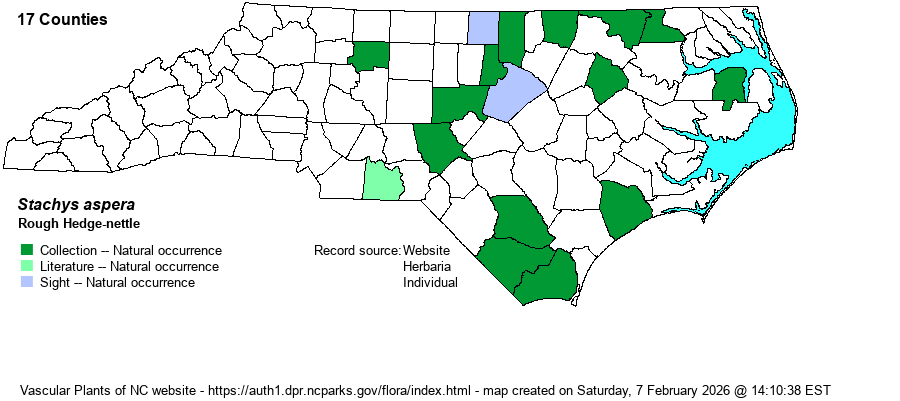| Author | Michaux | |
| Distribution | Considered as a variety in RAB (1968) -- S. hyssopifolia var. ambigua -- found scattered over the eastern Piedmont and more widely scattered over the Coastal Plain. Perhaps overlooked, or at least under-collected. However, the recent description of S. matthewsii from the Piedmont of NC and adjacent VA has caused some doubt about the identity of many or most NC specimens/records for S. aspera in the northeastern NC Piedmont. (These might now all be S. matthewsii). See journal paper by Fleming et al. (2011).
This is an Eastern species of somewhat limited distribution, ranging from NY west to IA, and south to GA and MS. | |
| Abundance | Uncommon but of uncertain identity in the northeastern Piedmont (Person and Warren south to Moore counties); rare in the Coastal Plain, more frequent in the northern portion, and very rare in the central and southern portions. This is a Watch List species. The NCNHP's State Rank of S2? is still appropriate, owing to confusion of some county records with S. matthewsii. | |
| Habitat | This is a wetland species, being found in damp ground in powerline clearings, wet fields, marsh edges, savannas, and openings in bottomlands or swamps. It favors sunny to partly sunny conditions. |
| Phenology | Blooms from June to August, and fruits from August to September. | |
| Identification | This is a fairly typical Stachys, growing mostly unbranched to about 2 feet tall, noticeably hairy/hispid on the stem angles. The scattered paired leaves are narrowly oblong to lanceolate, about 2 inches long and about 3/4-inch wide, finely serrated on the margins, and with a short petiole and often a truncate base; the leaf blade is somewhat widest below the middle. The extremely similar S. matthewsii has leaves that are widest around the middle and the leaf margins are more crenate and not finely serrated. The inflorescence is typical for the genus, being in numerous whorls in the upper leaf axils and stem top, with the pink flowers facing outward away from the stem; each flower is about 2/5-inch long. As there are a number of splits and several newly described species of Stachys in NC, you may want and need to collect a twig for keying out, especially as none of them are numerous east of the mountains. Despite S. aspera not being overly rare, it still is a very good find, usually found in a wet spot in powerline clearing or damp grassy place. | |
| Taxonomic Comments | Originally named as S. ambigua, and then later as S. hyssopifolia var. ambigua. Most references now treat it as a good species, as S. aspera.
Stachys is a large and complex genus that is still actively being worked on, and our understanding of the species is slowly being clarified. For interested readers, we recommend journal papers by Nelson (1981, 2008) and by Fleming et al. (2011). | |
| Other Common Name(s) | Hyssopleaf Hedge-nettle, Rough-leaved Hedge-nettle, Gritty Hedge-nettle. There is no common name even close to frequently used, and many such names are available. | |
| State Rank | S2? | |
| Global Rank | G4? | |
| State Status | W7 [W1] | |
| US Status | | |
| USACE-agcp | FAC link |
| USACE-emp | FACW link |

